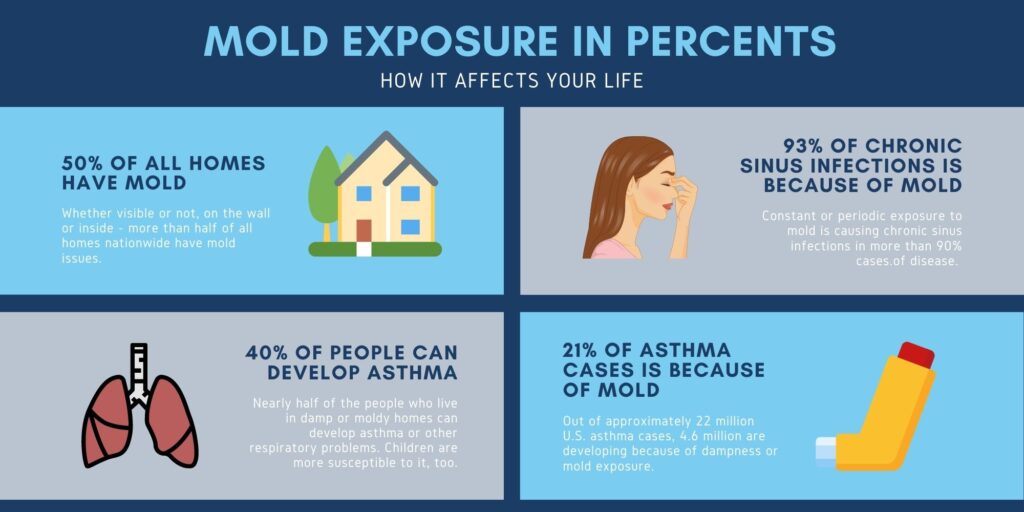Mold exposure can cause a range of unpleasant symptoms, and it is important to be able to recognize the telltale signs. From respiratory issues and allergic reactions to fatigue and skin rashes, this article will guide you through the common symptoms of mold exposure, helping you identify and address any potential health risks. So, if you’ve been experiencing unexplained health problems lately, it might be time to consider whether mold could be the culprit.

Respiratory Symptoms
If you’ve been exposed to mold, one of the most common symptoms you might experience is respiratory issues. These can manifest in various ways, including coughing, wheezing, and shortness of breath. Mold spores can irritate your respiratory system, leading to these uncomfortable symptoms. Additionally, you may also find yourself dealing with a runny or stuffy nose, sneezing, and a sore throat. These respiratory symptoms can be persistent and often worsen when you are in a moldy environment.
Skin Symptoms
Another set of symptoms that can occur as a result of mold exposure are related to the skin. If you notice any rashes or a sudden onset of itchy skin, it could be a sign of mold-related skin irritation. The presence of mold can cause redness or irritation on your skin, making you feel uncomfortable. In some cases, you may also experience dry or flaky skin as a result of mold exposure. Hives, characterized by raised bumps on the skin that are often itchy, can also be an indicator of mold-related skin symptoms.
Eye Symptoms
Mold exposure can affect not just your respiratory system and skin but also your eyes. If you find yourself with watery or red eyes, it could be a sign of mold-related eye irritation. The presence of mold spores in the air can cause your eyes to become easily irritated, leaving them watery and red. Additionally, you might also experience a burning or itching sensation in your eyes, making it uncomfortable to keep them open for long periods. Sensitivity to light and blurred vision can also be symptoms of mold-related eye issues.
Nasal Symptoms
Nasal symptoms can often occur alongside respiratory symptoms when you have been exposed to mold. One of the most common nasal symptoms is nosebleeds, which can be a result of the irritation caused by mold spores in your nasal passages. Sinus congestion can also be a troublesome symptom, leading to discomfort and difficulty breathing through your nose. This congestion can then result in headaches, adding to the overall discomfort experienced during mold exposure.

Neurological Symptoms
In some cases, mold exposure can even affect your neurological health. Memory problems and difficulty concentrating are two symptoms that you may experience. Mold toxins can have an impact on your brain, leading to cognitive issues such as brain fog, where you may struggle to think clearly or remember things. Dizziness can also occur, making it challenging to maintain your balance. Furthermore, mold exposure can cause fatigue, leaving you feeling constantly tired and drained.
Digestive Symptoms
Mold exposure can affect not only your respiratory system and neurological health but also your digestive system. Nausea and vomiting can be common symptoms, particularly if you have ingested mold-contaminated food or water. Diarrhea can also occur as a result of mold exposure, leading to frequent trips to the bathroom. Abdominal pain and discomfort may accompany these digestive symptoms, making it important to pay attention to your overall digestive health if you suspect mold exposure.

Musculoskeletal Symptoms
Muscle aches and joint pain can be another set of symptoms that occur as a result of mold exposure. Mold toxins can lead to inflammation in your muscles and joints, causing discomfort and pain. In some cases, you may also experience muscle weakness, making it difficult to perform daily tasks or engage in physical activities. It’s important to be mindful of any musculoskeletal symptoms you experience, as they could be indicative of mold exposure.
Cardiovascular Symptoms
Though less common, mold exposure can also have an impact on your cardiovascular system. Some individuals may experience an irregular heartbeat, which can be concerning. If you notice any changes in your heart rhythm or if you experience chest pain, it’s essential to seek medical attention. Additionally, mold exposure can also potentially raise your blood pressure, emphasizing the importance of monitoring your cardiovascular health if you suspect mold exposure.

Mental Health Symptoms
Mold exposure can not only affect your physical health but also your mental well-being. Symptoms such as depression, anxiety, mood swings, irritability, and even panic attacks can arise as a result of mold exposure. The presence of mold toxins in your environment can affect your brain chemistry and contribute to these mental health symptoms. It’s important to seek support and professional help if these symptoms persist or impact your daily life.
General Symptoms
In addition to the symptoms mentioned above, there are several general symptoms that can indicate mold exposure. Chronic fatigue, where you constantly feel tired and lacking in energy, can be a persistent issue for those exposed to mold. Frequent infections may also occur, as mold exposure can weaken your immune system. Unexplained weight loss can be another indicator of mold-related health issues. Additionally, some individuals may experience hair loss and night sweats, which can add to the overall discomfort experienced during mold exposure.
Recognizing the telltale signs of mold exposure is crucial for taking the necessary steps to protect your health. If you suspect mold in your environment and are experiencing any of these symptoms, it’s important to seek professional help and address the issue promptly. Remember, your health and well-being deserve the utmost attention, so don’t hesitate to take action if you suspect mold exposure is impacting your life.
